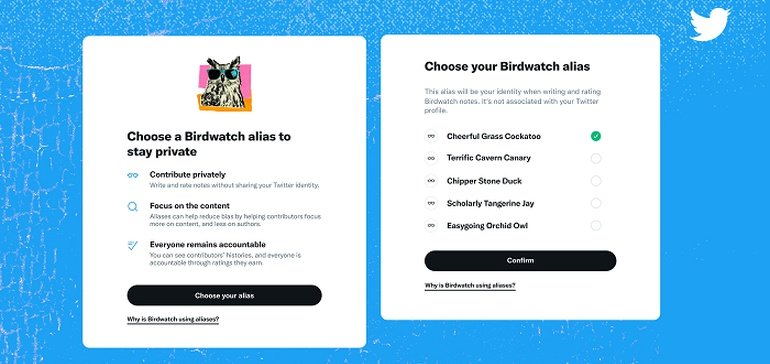Mobile App Development, SEO, Social Media, Uncategorized, Web Development, Website Design
Twitter Will Now Let Birdwatch Contributors Use Aliases in Their Reports
- By Brett Belau
22 Nov

Twitter has added a new option to its ‘Birdwatch’ crowd-sourced misinformation detection program, with Birdwatch contributors now able to issue reports under an alias, via Twitter’s randomly-generated, bird-related identities.
Birdwatch enables Twitter users who are part of the program to add notes to questionable tweets, potentially helping to flag misinformation or other forms of harmful content. Using this expanded pool of reports, Twitter’s looking to advance its efforts to stamp out dangerous content, and keep ahead of misuse, which its detection systems otherwise might miss.
And as you can see here, now, for those looking to take part in the Birdwatch program, they’ll be able to list their input under, say ‘Terrific Cavern Canary’ instead of their actual @handle, which could help people feel more comfortable in such reporting.
As explained by Twitter:
“We know that not everyone feels comfortable contributing under their @handle. From our most active contributors to prospective participants, people overwhelmingly voiced a preference for contributing under aliases.”
Which makes sense – you don’t want to inadvertently become the focus of ire of some web crackpot as a result of your Birdwatch reports, which would no doubt play at least some part in how contributors currently post, or don’t, when they find questionable reports.
Twitter also notes that this preference was strongest among women and black contributors, while research has also shown that aliases have the potential to reduce bias, by putting more focus on the content of each note, not the author of such.
In addition to this, Twitter says that it’s also rolling out Birdwatch profile pages, which will make it easier to see each contributors’ past notes and alerts, so there will be a way to track activity, even without the users’ real @handle assigned to each report.
It’s a small, but valuable addition to the Birdwatch process, which could help to see more user reports issued, while also still facilitating full transparency on their past reports, in case someone might be looking to misuse the option to falsely flag tweets.
It’s still too early to say whether Birdwatch will prove valuable. The concept has merit, in broadening the pool of potential monitors of questionable tweet content, but how insightful, and valuable, such reports will be is another consideration, as well as potential misuse or misunderstanding of the process.
But it could prove to be a valuable addition to the broader detection scope of the platform, and alias accounts may well be a key function that will broaden usage.
Birdwatch is currently only available in the US – you can find more information on the program here.
Source: www.socialmediatoday.com, originally published on 2021-11-22 14:08:22
Connect with B2 Web Studios
Get B2 news, tips and the latest trends on web, mobile and digital marketing
- Appleton/Green Bay (HQ): (920) 358-0305
- Las Vegas, NV (Satellite): (702) 659-7809
- Email Us: [email protected]

© Copyright 2002 – 2022 B2 Web Studios, a division of B2 Computing LLC. All rights reserved. All logos trademarks of their respective owners. Privacy Policy

![How to Successfully Use Social Media: A Small Business Guide for Beginners [Infographic]](https://b2webstudios.com/storage/2023/02/How-to-Successfully-Use-Social-Media-A-Small-Business-Guide-85x70.jpg)



![How to Successfully Use Social Media: A Small Business Guide for Beginners [Infographic]](https://b2webstudios.com/storage/2023/02/How-to-Successfully-Use-Social-Media-A-Small-Business-Guide-300x169.jpg)


Recent Comments